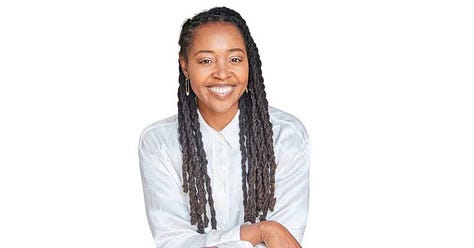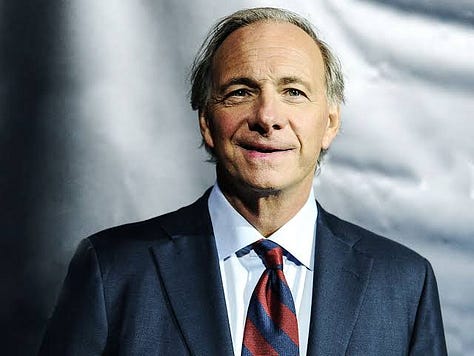Why Does Everything Feel Like It’s Falling Apart?
Why everything feels uncertain and how to prepare for what’s next
happy Sunday friends,
I hope you all are doing ok. It's a dark and stormy day here in Atlanta, which is my favorite. I love days where there’s no expectation to go outside or do anything. Something about a dark and stormy night that gives permission to be a bit more lazy, introspective, and cozy. I've been obsessing over March Madness. It's my favorite sports tournament of the year and it hasn’t disappointed me.
listen. This week was a week, ok? The news on tariffs was unlike anything we’ve seen in our generation. I realize he’s only been in office for 3 months, and it’s already hard to imagine what 3 years of this might look like. People are talking about a potential recession, asking how bad it could get. Well, friends. We are in for quite the adventure over the next decade. and I'm going to explain it the best way I know how.
If you've ever been to my house, you know books are everywhere. on tables, shelves, bookcases, kitchen counters. I have so much reverence for books and the people who write them. I'm obsessed with the ability to distill wisdom and conviction into a form that can be held, passed down, returned to.
this week, I felt led back to two of them:
Principles for Dealing with the Changing World Order by Ray Dalio
Man’s Search for Meaning by Viktor E. Frankl
I first read both of them in 2021, when I was walking through my own version of existential dread. turns out, they’re even more relevant now.
let’s start with Ray Dalio.
Dalio is one of the great financial minds of our time, a hedge fund investor and economist who has spent his life studying global power cycles and economic history. His whole philosophy is rooted in “principles," breaking things down to the cause-and-effect patterns that repeat across time.
Through studying centuries of history, Dalio found that every major empire follows a similar pattern: rise, peak, decline. What we’re living through right now is not random. It's not new. It's a part of a pattern.
“to see the big picture, you can’t focus on the details.” – Ray Dalio
He breaks each empire into what he calls a big cycle, usually lasting around 250 years. and within that cycle, you can track the stages of power like clockwork:
early rise – when a nation is poor but hungry. Working hard, saving money, investing in education, innovating.
acceleration – productivity rises. institutions strengthen. the world starts paying attention.
peak power – the country becomes the global leader. Its currency becomes the world’s reserve. People live well.
complacency and excess – debt increases. wealth gaps grow. values erode.
decline – internal conflict escalates. External rivals challenge its dominance. inflation rises. trust collapses.
sound familiar? we are not at the beginning of the fall. we are deep in it. and most people are still surprised. By his estimation, we’re not looking at a random moment of chaos. We're living through the end of a cycle.
“No system of government, no economic system, no currency, and no empire lasts forever. Yet almost everyone is surprised and ruined when they fall.” - Ray Dalio
This is what Dalio is trying to help us see: the forces shaping our world are bigger than the headlines. bigger than political parties. bigger than any one leader. They are historical, cyclical, and most of all predictable. He writes that every declining empire shares the same warning signs. And here’s what they look like in real time:
1. massive debt and money printing: the u.s. is carrying more than $34 trillion in national debt. Just the interest payments are now bigger than our military budget. During the pandemic, the federal reserve printed trillions of dollars to stimulate the economy. The long-term effects of that are still unfolding.
2. rising internal conflict and wealth inequality: America is fractured. 63% of Americans live paycheck to paycheck. The top 10% hold more than 70% of the nation’s wealth. strikes, walkouts, culture wars, political extremism, and disillusionment with democracy. They're signs of systemic instability.
3. weakened education and loss of shared values: the u.s. ranks 35th in math and 13th in reading among industrialized nations. students are disengaged. Teachers are leaving. trust in education systems is eroding.
4. a rising external rival: China is now the second-largest economy in the world. They're investing in ai, expanding militarily, and gaining influence across africa, asia, and latin america. They're preparing for a post-american world. and so are others. The dollar is losing strength as the global reserve currency, and the world is watching how we respond.
5. declining global trust and morale: our response to covid, the January 6 insurrection, our foreign policy, and the growing distrust of every institution from congress to courts to corporations has chipped away at our moral credibility. We still have power. but the world doesn’t see us the same way. and deep down, we don’t either.
This is the uncomfortable truth: this has happened to every great empire. every single one. They all followed this pattern. and they all believed they would be the exception. Our exceptionalism is what keeps us blind. We keep thinking collapse is something that happens somewhere else. to other people. in other countries. but history says otherwise.
Dalio writes that the average empire lasts about 250 years. if you start the clock at 1776, the "birth" of the United States, we are now 249 years in.
now, let’s talk about Viktor Frankl.
If Dalio explains what’s happening and why it feels like everything is falling apart, Frankl gives us a way to live through it.
He was a psychiatrist, neurologist, and philosopher. But more than that, he was a witness. He survived Auschwitz. He was stripped of everything.
man’s search for meaning wasn’t written in hindsight or safety. He began developing its core ideas while inside the camps and observing who seemed to endure. He noticed something most people missed: it wasn’t the strongest who survived. It was those who had something to live for. a reason. a belief. a future they could still imagine.
he wrote:
“those who have a why to live can bear almost any how.”
(a quote he borrowed from Nietzsche, but lived into deeply)
He wasn’t prescribing toxic positivity. He was describing what it took to remain human in the darkest of circumstances.
If the next decade is going to be as destabilizing as we think, then we need more than coping strategies. We need a why.
knowing your why.
The data says that 85% of us don’t know our why. That means most of us are moving through life unclear on what we’re here to do.
We were born into this moment on purpose. We have gifts that were entrusted to you for right now. and this season isn’t about getting. It's about giving. The greatest among us will be servants.
The most powerful thing you can do in the face of global uncertainty is to become clear on who you are becoming. because becoming isn’t branding. It's not a self-improvement project. It's about becoming the answer to a problem. the solution to a need. the expression of love, justice, clarity, or restoration in a specific area of the world that’s breaking.
your becoming is not just for you. It's meant to be expressed in every domain of influence you touch: yourself → your family → your neighborhood → your city → your nation → your generation.
This is how we rebuild what's meant to come next. not with fear, but with generosity. not with nostalgia for the world we thought we’d have, but with vision for the one we’re called to create.
So friends, we have to let go of what we thought things would be. They will never be the same. but maybe that’s the beginning of something better.
Follow the Leader
Leaders shining bright for a time such as this



Uncommon Favor: I love Dawn Staley. I played basketball as a kid and she, Lisa Leslie and Sheryl Swoopes were my people. I love how Dawn builds a culture with her team. a place where people want to play not just because of their love of basketball but because they want to be under her leadership. she breeds not just great players, but incredible women and leaders that stand out long after their time at SC. She’s been so intentional about building an institution and incredible system despite the epic loss today. She’s fearless, authentic and moves with a conviction I can believe in. Preorder her new book, Uncommon Favor here.
No One is Self Made: I met Dr. Key when I first moved to Atlanta. She’s one of those people who know is meant to change the world. She’s calm, clear, and concise in her mission to show us how to build community. Her message is for a time such as this and echoes one of the most important verses in Genesis, “man is not meant to be alone.” I read her new book, “No One is Self Made,” this weekend and in a world of hyper-individualism and selfish ambition masked as service, she is a like water in a dry desert. In these times we need each other more than ever and Dr. Key is here to show us how to build and climb together. Grab her book here and follow her on IG here.
Principles: I have almost all of Ray Dalio’s work. Like I mentioned above, he’s so clear in breaking down complex issues. I also love that he creates every kind of format to get his message across. Instead of picking up the book I mentioned above, what this incredible animation of the same concept on his YouTube channel here.
sending you so much love wherever you are,
– m






Great breakdown! And yasss to adding Key to the list! Her message and book are soon important.
Thanks for this breakdown. I expect that I will be referring back to this often. Yes we have been in a national identity crisis for quite some time. I’ve written about it do a certain degree. Lack of purpose has a destabilizing effect. I think what may be different with technology is perhaps just steering clear of the cliff. Whereas in times past, average folks were pretty much in the dark and had no idea a cliff was ahead. Even though we certainly could’ve prevented this chaos, we might be able to mitigate it.